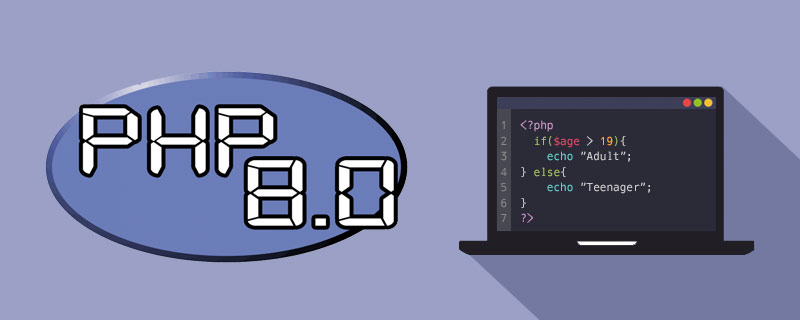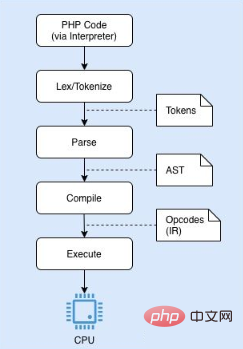What is PHP8's JIT?
JIT is a compiler strategy that expresses code into an intermediate state, converts it into architecture-dependent machine code at runtime, and executes it on the fly. In PHP8, Zend VM does not Certain opcodes need to be interpreted and these instructions will be executed directly as CPU level instructions.

JIT for PHP 8
PHP 8 Just In Time (JIT) Compiler The impact is unquestionable. But so far, I've found that very little is known about what JIT is supposed to do.
Recommended video tutorial: "PHP Programming from Beginner to Mastery"
After many studies and giving up, I decided to check the PHP source code myself. Combining some of my knowledge of the C language and all the bits and pieces of information I've gathered so far, I've come up with this article, which I hope will help you understand PHP's JIT better.
To put it simply: When the JIT works as expected, your code is not executed through the Zend VM, but directly as a set of CPU-level instructions.
That's the whole idea.
But to understand it better we need to consider how php works internally. Not very complicated, but needs some introduction.
How is PHP code executed?
As we all know, PHP is an interpreted language, but what does this sentence itself mean?
Every time PHP code (command line script or WEB application) is executed, it must go through the PHP interpreter. The most commonly used are the PHP-FPM and CLI interpreters.
The interpreter's job is simple: receive PHP code, interpret it, and return the result.
General interpreted languages follow this process. Some languages may eliminate a few steps, but the general idea is the same. In PHP, the process is as follows:
Reads the PHP code and interprets it as a set of keywords called Tokens. This process lets the interpreter know what code has been written in each program. This step is called Lexing or Tokenizing.
After getting the Tokens collection, the PHP interpreter will try to parse them. An abstract syntax tree (AST) is generated through a process called Parsing. Here AST is a set of nodes representing what operations to perform. For example, "echo 1 1" actually means "print the result of 1 1" or more specifically "print an operation, this operation is 1 1".
With AST, operations and priorities can be understood more easily. Converting an abstract syntax tree into an operation that can be executed by the CPU requires a transition expression (IR), which in PHP we call Opcodes. The process of converting ASTs into Opcodes is called compilation.
With Opcodes, here comes the fun part: executing code! PHP has an engine called Zend VM that is able to receive a sequence of Opcodes and execute them. After all Opcodes are executed, Zend VM terminates the program.
This is a process diagram including the Opcache extension:

What is the effect of JIT compilation?
After listening to Zeev's PHP and JIT broadcast on PHP Internals News, I figured out what JIT actually does.
If the Opcache extension can get Opcodes faster and transfer them directly to the Zend VM, the JIT allows them to run without using the Zend VM at all.
Zend VM is a program written in C that acts as a layer between Opcodes and the CPU. JIT generates compiled code directly at runtime, so PHP can
skip the Zend VM and be executed directly by the CPU. In theory, performance will be better.
This sounds strange because a specific implementation needs to be written for each type of structure before it can be compiled into machine code. But in fact this is reasonable.
PHP's JIT uses a library called DynaASM (Dynamic Assembler), which maps a set of CPU instructions in a specific format into assembly code for many different CPU types. Therefore, the compiler only needs to use DynASM to convert Opcodes into machine code for a specific structure.
However, there is a problem that has troubled me for a long time.
If preloading can parse PHP code into Opcodes before execution, and DynASM can compile Opcodes into machine code (Just In Time compilation), why don't we use pre-run compilation (Ahead of Time compilation) immediately What about compiling PHP immediately?
One of the reasons I found out by listening to Zeev's broadcast is that PHP is a weakly typed language, which means that PHP usually doesn't know the type of a variable until the Zend VM tries to execute an opcode.
You can check the Zend_value union type to learn that many pointers point to variables of different types. Whenever Zend VM tries to get a value from a Zend_value, it uses a macro like ZSTR_VAL to get a pointer to a string in the union type.
For example, this Zend VM handler handles "less than or equal to" (
It is not feasible to perform type inference logic using machine code, and may become slower.
Evaluating first and then compiling is also not a good option because compiling to machine code is a CPU-intensive task. So compiling everything at runtime is also not good.
The above is the detailed content of What is PHP8's JIT?. For more information, please follow other related articles on the PHP Chinese website!

Hot AI Tools

Undresser.AI Undress
AI-powered app for creating realistic nude photos

AI Clothes Remover
Online AI tool for removing clothes from photos.

Undress AI Tool
Undress images for free

Clothoff.io
AI clothes remover

Video Face Swap
Swap faces in any video effortlessly with our completely free AI face swap tool!

Hot Article

Hot Tools

Notepad++7.3.1
Easy-to-use and free code editor

SublimeText3 Chinese version
Chinese version, very easy to use

Zend Studio 13.0.1
Powerful PHP integrated development environment

Dreamweaver CS6
Visual web development tools

SublimeText3 Mac version
God-level code editing software (SublimeText3)

Hot Topics
 1668
1668
 14
14
 1428
1428
 52
52
 1329
1329
 25
25
 1273
1273
 29
29
 1256
1256
 24
24
 PHP: A Key Language for Web Development
Apr 13, 2025 am 12:08 AM
PHP: A Key Language for Web Development
Apr 13, 2025 am 12:08 AM
PHP is a scripting language widely used on the server side, especially suitable for web development. 1.PHP can embed HTML, process HTTP requests and responses, and supports a variety of databases. 2.PHP is used to generate dynamic web content, process form data, access databases, etc., with strong community support and open source resources. 3. PHP is an interpreted language, and the execution process includes lexical analysis, grammatical analysis, compilation and execution. 4.PHP can be combined with MySQL for advanced applications such as user registration systems. 5. When debugging PHP, you can use functions such as error_reporting() and var_dump(). 6. Optimize PHP code to use caching mechanisms, optimize database queries and use built-in functions. 7
 PHP vs. Python: Understanding the Differences
Apr 11, 2025 am 12:15 AM
PHP vs. Python: Understanding the Differences
Apr 11, 2025 am 12:15 AM
PHP and Python each have their own advantages, and the choice should be based on project requirements. 1.PHP is suitable for web development, with simple syntax and high execution efficiency. 2. Python is suitable for data science and machine learning, with concise syntax and rich libraries.
 PHP and Python: Comparing Two Popular Programming Languages
Apr 14, 2025 am 12:13 AM
PHP and Python: Comparing Two Popular Programming Languages
Apr 14, 2025 am 12:13 AM
PHP and Python each have their own advantages, and choose according to project requirements. 1.PHP is suitable for web development, especially for rapid development and maintenance of websites. 2. Python is suitable for data science, machine learning and artificial intelligence, with concise syntax and suitable for beginners.
 PHP in Action: Real-World Examples and Applications
Apr 14, 2025 am 12:19 AM
PHP in Action: Real-World Examples and Applications
Apr 14, 2025 am 12:19 AM
PHP is widely used in e-commerce, content management systems and API development. 1) E-commerce: used for shopping cart function and payment processing. 2) Content management system: used for dynamic content generation and user management. 3) API development: used for RESTful API development and API security. Through performance optimization and best practices, the efficiency and maintainability of PHP applications are improved.
 The Enduring Relevance of PHP: Is It Still Alive?
Apr 14, 2025 am 12:12 AM
The Enduring Relevance of PHP: Is It Still Alive?
Apr 14, 2025 am 12:12 AM
PHP is still dynamic and still occupies an important position in the field of modern programming. 1) PHP's simplicity and powerful community support make it widely used in web development; 2) Its flexibility and stability make it outstanding in handling web forms, database operations and file processing; 3) PHP is constantly evolving and optimizing, suitable for beginners and experienced developers.
 PHP and Python: Different Paradigms Explained
Apr 18, 2025 am 12:26 AM
PHP and Python: Different Paradigms Explained
Apr 18, 2025 am 12:26 AM
PHP is mainly procedural programming, but also supports object-oriented programming (OOP); Python supports a variety of paradigms, including OOP, functional and procedural programming. PHP is suitable for web development, and Python is suitable for a variety of applications such as data analysis and machine learning.
 PHP vs. Other Languages: A Comparison
Apr 13, 2025 am 12:19 AM
PHP vs. Other Languages: A Comparison
Apr 13, 2025 am 12:19 AM
PHP is suitable for web development, especially in rapid development and processing dynamic content, but is not good at data science and enterprise-level applications. Compared with Python, PHP has more advantages in web development, but is not as good as Python in the field of data science; compared with Java, PHP performs worse in enterprise-level applications, but is more flexible in web development; compared with JavaScript, PHP is more concise in back-end development, but is not as good as JavaScript in front-end development.
 PHP and Python: Code Examples and Comparison
Apr 15, 2025 am 12:07 AM
PHP and Python: Code Examples and Comparison
Apr 15, 2025 am 12:07 AM
PHP and Python have their own advantages and disadvantages, and the choice depends on project needs and personal preferences. 1.PHP is suitable for rapid development and maintenance of large-scale web applications. 2. Python dominates the field of data science and machine learning.




